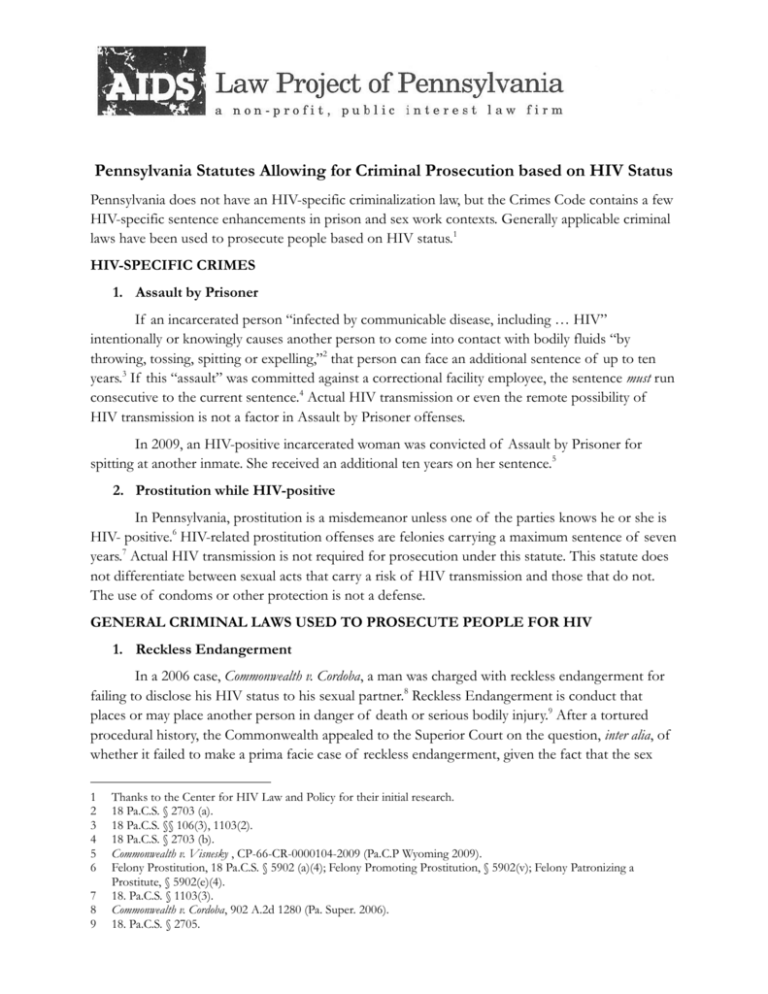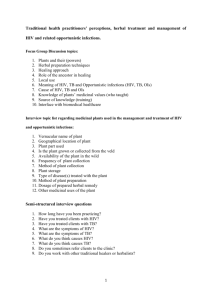
Pennsylvania Statutes Allowing for Criminal Prosecution based on HIV Status
Pennsylvania does not have an HIV-specific criminalization law, but the Crimes Code contains a few
HIV-specific sentence enhancements in prison and sex work contexts. Generally applicable criminal
laws have been used to prosecute people based on HIV status.1
HIV-SPECIFIC CRIMES
1. Assault by Prisoner
If an incarcerated person “infected by communicable disease, including … HIV”
intentionally or knowingly causes another person to come into contact with bodily fluids “by
throwing, tossing, spitting or expelling,”2 that person can face an additional sentence of up to ten
years.3 If this “assault” was committed against a correctional facility employee, the sentence must run
consecutive to the current sentence.4 Actual HIV transmission or even the remote possibility of
HIV transmission is not a factor in Assault by Prisoner offenses.
In 2009, an HIV-positive incarcerated woman was convicted of Assault by Prisoner for
spitting at another inmate. She received an additional ten years on her sentence.5
2. Prostitution while HIV-positive
In Pennsylvania, prostitution is a misdemeanor unless one of the parties knows he or she is
HIV- positive.6 HIV-related prostitution offenses are felonies carrying a maximum sentence of seven
years.7 Actual HIV transmission is not required for prosecution under this statute. This statute does
not differentiate between sexual acts that carry a risk of HIV transmission and those that do not.
The use of condoms or other protection is not a defense.
GENERAL CRIMINAL LAWS USED TO PROSECUTE PEOPLE FOR HIV
1. Reckless Endangerment
In a 2006 case, Commonwealth v. Cordoba, a man was charged with reckless endangerment for
failing to disclose his HIV status to his sexual partner.8 Reckless Endangerment is conduct that
places or may place another person in danger of death or serious bodily injury.9 After a tortured
procedural history, the Commonwealth appealed to the Superior Court on the question, inter alia, of
whether it failed to make a prima facie case of reckless endangerment, given the fact that the sex
1
2
3
4
5
6
7
8
9
Thanks to the Center for HIV Law and Policy for their initial research.
18 Pa.C.S. § 2703 (a).
18 Pa.C.S. §§ 106(3), 1103(2).
18 Pa.C.S. § 2703 (b).
Commonwealth v. Visnesky , CP-66-CR-0000104-2009 (Pa.C.P Wyoming 2009).
Felony Prostitution, 18 Pa.C.S. § 5902 (a)(4); Felony Promoting Prostitution, § 5902(v); Felony Patronizing a
Prostitute, § 5902(e)(4).
18. Pa.C.S. § 1103(3).
Commonwealth v. Cordoba, 902 A.2d 1280 (Pa. Super. 2006).
18. Pa.C.S. § 2705.
engaged in (oral sex with ejaculation on the face and chest) has an extremely low transmission risk
and the complaining party did not become infected. The Superior Court held a charge of reckless
endangerment may be sustained with only be a possibility of risk of harm, regardless of the
likelihood of the harm occurring.10 This case was then returned to the Court of Common Pleas,
where it was dismissed because the complaining witness failed to testify.11
Disclosure of HIV status is a defense against prosecution for serodiscordant sexual activity
under the Reckless Endangerment statute.
2. Aggravated Assault
Aggravated Assault is causing or attempting “to cause serious bodily injury to another …
under circumstances manifesting extreme indifference to the value of human life,”12 Aggravated
assault is a first degree felony carrying up to a 20-year incarceration sentence,13 (compared with
simple assault, generally a second degree misdemeanor carrying a two year maximum).14 A few cases
in the 1990s led to conviction for Aggravated Assault because of the defendant's HIV status. The
assaults in question involved biting15 and throwing feces16 - not generally considered “serious bodily
injury.” It was only the HIV status of the defendants that made the assaults “serious,” despite the
fact that HIV transmission was not possible.
3. Attempted Murder
In a late 1990s case, an HIV-positive man was charged with attempted third-degree murder
for failing to disclose his status in five consensual sexual relationships. The defendant died before
the case could be tried.17
4. Terroristic Threats
In a 2004 case, Commonwealth v. Walker, an HIV-positive man was convicted of making
terroristic threats when he scratched a police officer and told the officer he had open cuts on his
hands and said “I'm taking you with me.”18 Terroristic Threats is the communication, direct or
indirect, of a threat of violence “with intent to terrorize another.”19 It is a first-degree
misdemeanor,20 carrying a maximum five-year imprisonment sentence.21
10 Cordoba, 902 A.2d at 1289.
11 Order Granting Petition for Writ of Habeus Corpus, Cordoba, CP-06-CR-0000586-2005 (Pa.C.P. Berks, Nov. 29
2007).
12 18 Pa.C.S. § 2702(a)(1).
13 18 Pa.C.S. § 1103(1).
14 18 Pa.C.S. §§ 2701(b), 1104(2).
15 Commonwealth v. Perez, CP-39-CR-0001227-1998 (Pa.C.P. Lehigh 1998) (HIV-positive man convicted of Aggravated
Assault for biting a security guard).
16 Commonwealth v. Brown, 605 A.2d. 429 (Pa. Super. Ct. 1992) (HIV positive inmate convicted of Aggravated Assault
for throwing fecal matter at a prison guard).
17 Debbie Garlicki, Man Who Allegedly Infected with the AIDS Virus Dies, MORNING CALL (Allentown, PA), Nov. 20,
1999. available at http://articles.mcall.com/2000-12-01/news/3330315_1_aids-virus-infected-murder-charge.
18 Commonwealth v. Walker, 836 A.2d 562 (Pa. Super Ct. 2004).
19 18. Pa.C.S. § 2706(a)(1).
20 18. Pa.C.S. § 2706(d).
21 18 Pa.C.S. § 107(b)(6).






